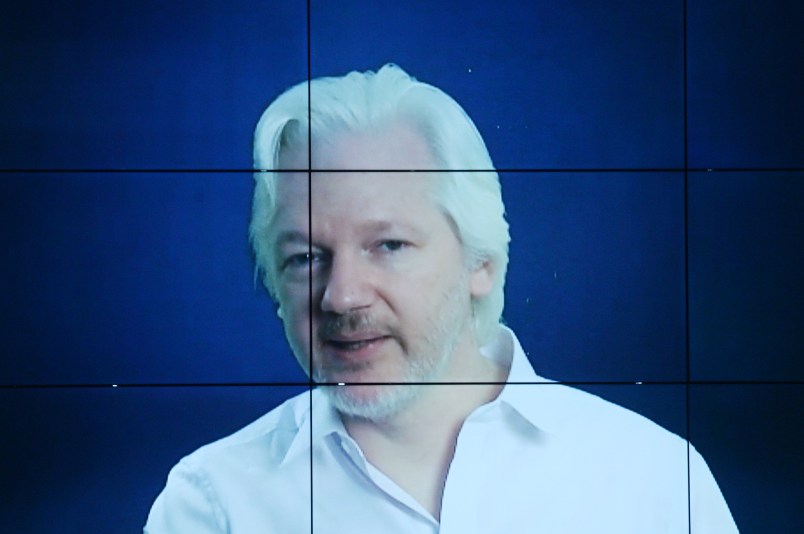What was happening while Wikileaks was trying to get Donald Trump Jr. to help with the press rollout of Democratic officials’ hacked emails?
Amid the questions of what Donald Jr.’s messages to Wikileaks “prove,” it’s worth looking at when exactly they fall in the summer 2016 sequence of theft and distribution of Clinton campaign and Democratic party emails.
As always, it’s hard to tell what constitutes small talk and what should be construed as cooperation. But after Julia Ioffe’s revelation of Donald Trump, Jr.’s direct-message back-and-forth with the Wikileaks account, it’s clear from both the Donalds Trump and public interviews by Roger Stone that the campaign was excited about the possibility that Wikileaks might have something genuinely incriminating about Hillary Clinton to release to the general public—following the senior Trump’s public request in July that Russia release exactly that sort of thing and “be rewarded mightily by our press.”
In all of this, consider the way the press handled the various leaks of Democratic politicians’ emails: When those emails were posted on the DCLeaks blog or sent to reporters by Guccifer 2.0—two distributors that were painfully obviously cutouts for Russian intelligence—the press understandably treated the distributions as an information security story. And indeed, Guccifer in particular was recently found to have altered the stolen information before passing it along to journalists, as the same Russian intelligence unit has done in other cases.
But, probably because of its role in the Edward Snowden revelations, Wikileaks commanded much more serious treatment (it also doesn’t appear to have changed the contents of the emails it received and distributed).
July: Wikileaks Drops The DNC Emails
On July 22, Wikileaks published almost 20,000 emails from the Democratic National Committee. The understanding that the Russian government was behind the initial hack was by that point widespread, both in the government and the news media.
The DNC and the Clinton campaign, who had been warned by the FBI months earlier that DNC systems had been compromised by Russian state actors, finally agreed to go public with those accusations on the 25th. They had hired an independent cybsecurity firm, CrowdStrike, rather than turn their servers over to the FBI, which was still investigating whether Clinton had mishandled classified information.
August: Trump Associates Size Up Wikileaks
Roger Stone repeatedly communicated with multiple people who had the emails stolen by the Russian government. On the 14th, he had “innocuous” direct-message conversations with Guccifer 2.0 on Twitter, according to the Washington Times. On August 16, Roger Stone told popular conspiracist blogger and YouTube personality Alex Jones he was in contact with Wikileaks, and that Julian Assange had “political dynamite” on Clinton. He repeated the claim on C-Span—Wikileaks denied it. On August 21, Stone tweeted that it would soon be John Podesta’s “time in the barrel.”
But the idea of cooperating with Wikileaks held appeal for the rest of the campaign, too: Some time that same month, major Trump donor Rebekah Mercer reportedly asked Cambridge Analytica whether it could more effectively organize the DNC email dump, which Wikileaks was apparently having trouble handling due to its huge size and timely nature.
September: Wikileaks Starts Communicating With Donald Trump, Jr. Directly
Late on Sept. 20, the Wikileaks Twitter account sent Donald Trump, Jr. a message providing the password to a new Mother Jones project called putintrump.org (the password was putintrump).
Donald Jr. emailed senior campaign officials about the exchange, Mother Jones reports—and then the project was flooded with suspicious traffic and spam, and the people working on it saw their personal information spread online. Donald Jr. thanked Wikileaks—probably Assange—and the conversation went dark …
October: Wikileaks Begins Helping The Trump Campaign In Earnest
…until October 3, when Wikileaks asked the younger Trump to promote a story about Clinton joking about killing Assange in a drone strike. Donald Jr. had already tweeted the story, but wanted more information on “The Wednesday leak”—yet another thing Roger Stone had tweeted about that day (a Sunday).
It didn’t come Wednesday, but Friday: The Washington Post published a story including excerpts from a recording of Trump bragging about grabbing women “by the pussy” into a hot mic. An hour later, Wikileaks began dumping John Podesta’s emails including excerpts from Clinton’s Goldman Sachs speeches. Assange had hated Clinton for years—now, it seemed, he was taking revenge.
A few days later, Wikileaks asked Donald Jr for help promoting the story, which dominated headlines that week. The Wikileaks message praised “you and your dad talking about our publications,” and suggested Donald Jr tweet a more obscure link that would help curious users search its huge database of Democratic emails. He did, two days later; 15 minutes after the pleased message, Donald Sr. tweeted about “very little pickup by the dishonest media” of the Wikileaks dumps, something that, while in no way true, probably helped to drive the story further.
Wikileaks also offered to do damage control for Trump through Donald, Jr. by getting out ahead of embarrassing revelations—Wikileaks requested a Trump tax return on October 21—though they don’t appear to have gotten one.
November and beyond: “Wow.”
That was Wikileaks’ one-word reaction to Trump’s election. Weeks later, in December, Wikileaks asked Donald Jr. to put in a good word for him in an especially novel way: Ask Australia to make him ambassador to the US.
Trump should say “‘That’s ‘a real smart tough guy and the most famous australian [sic] you have!’ or something similar,” the Wikileaks account operator wrote. “They won’t do it but it will send the right signals to Australia, UK + Sweden to start following the law and stop bending it to ingratiate themselves with the Clintons.”
Trump did not get to that request in his first formal conversation with the Australian government in Janaury, which went about as badly as possible.
“I have been making these calls all day and this is the most unpleasant call all day,” Trump told Australian prime minister Malcolm Turnbull.
“Putin was a pleasant call.”









